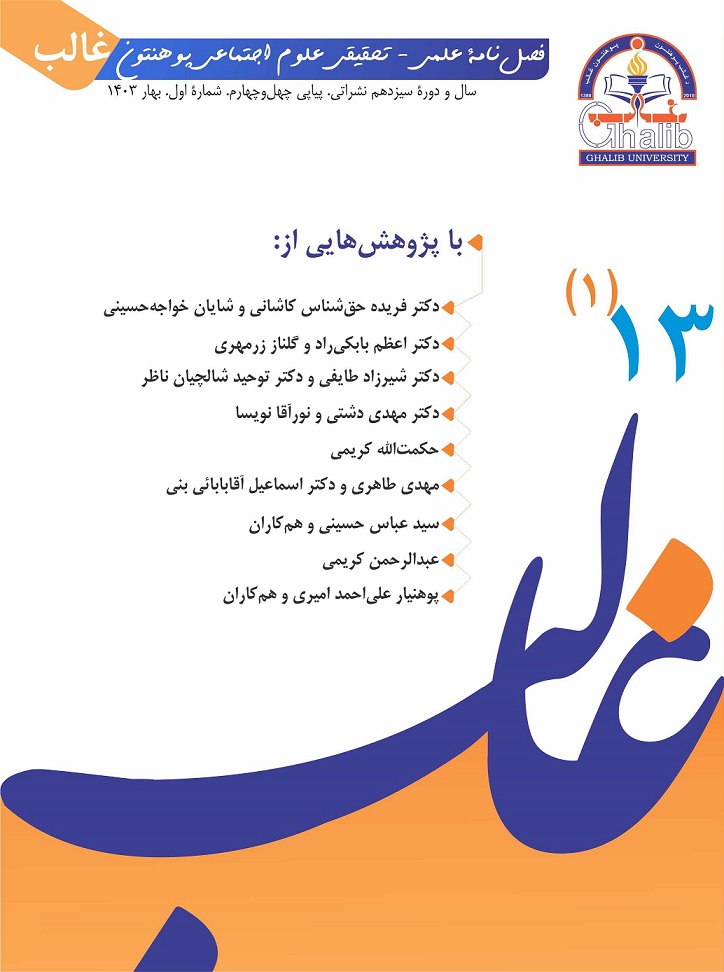Analysis of the Place of Ethical Behavior in the Fictional Works of Yaqub Yad Ali ased on the Doctrine of Jacques Marie Émile Lacan
DOI:
https://doi.org/10.58342/ghalibqj.V.13.I.1.3Keywords:
Jacques Marie Émile Lacan, Yaqub Yad Ali, Psychoanalytic Critique, Ethical Subject, JoesanceAbstract
Jacques Marie Émile Lacan was one of the thinkers who reread the category of ethics based on psychoanalytical doctrine. He considered adherence to the sign of desire as a criterion for ethical behavior. In this research, we have tried to evaluate the actions of the characters in Yaqoub Yad Ali's fictional works according to the psychoanalytic teachings of Lacan. Based on this, it is necessary to explain the relationship between the place of desire as a psychological matter and ethic. One of the goals of the authors in this research is to explain the distinction between the desire of the subject and The Other as an irreconcilable divergence. In this regard, the question has been answered that based on Lakan's psychoanalytical teachings, which one of Yad Ali's fictional characters had an ethical action, and which one had an immoral action? This research has been done by qualitative analysis based on the teachings of Lacan and the collection of fiction works of Yaqub Yad Ali. The findings of the research show that the establishment of the desire suppression mechanism causes the subject to encounter the phenomenon of loss or deprivation. The subject identifies the signifier of The Other’s desire as the signifier of his desire and fulfills it. According to Lakan, the ethical behavior becomes possible when the subject always remains faithful to the signifier of his true desire. The ethical subject in Lakan's view is the one who, in the face of the law, always transgresses it through the sign of joesance.
References
ایوانز، دیلن. (1401). واژهنامه روانکاوی لکانی. چ2. تهران- ایران: اتاق آبی.
پویمان، لویی. (1378). درآمدی بر فلسفۀ اخلاق. ترجمۀ شهرام ارشدنژاد. تهران- ایران: گیل.
جی. وارنوک، جی. (1368). فلسفۀ اخلاق در قرن حاضر. تهران- ایران: مرکز ترجمه و نشر کتاب.
ژکس. (1355). فلسفۀ اخلاق: حکمت عملی. ترجمۀ سیدابوالقاسم پورحسینی. تهران- ایران: کتابهای سیمرغ (وابسته به امیرکبیر).
ژیژک، اسلاوی. (1386). لاکان- هیچکاک. چ2. تهران- ایران: ققنوس.
ژیژک، اسلاوی. (1389). خشونت(پنج نگاه زیرچشمی). تهران- ایران: نی.
طایفی، شیرزاد؛ شالچیان ناظر، توحید. (1402). «زبان، ابزاری در احراز یا عدم احراز اُبژۀ میل در داستانهای "خونخورده" و "بازگشت"». ایران: مجلة مطالعات زبانی و بلاغی. 32. صص 258-217.
طایفی، شیرزاد. (1402). «از فقدان تا مازاد در کلام: خوانش لکانی داستانهای قصر پرندگان غمگین و سکته قبلی». ایران: پژوهشنامۀ ادبیات کردی. 1(15). صص 1-16.
کالر، جاناتان. (1382). نظریۀ ادبی: معرفی بسیار مختصر. ترجمۀ فرزانه طاهری. تهران- ایران: مرکز.
لوین و دیگران. (1370). فلسفه یا پژوهش حقیقت. ترجمۀ سیدجلالالدین مجتبوی. تهران: حکمت.
موللی، کرامت. (1398). مقدماتی بر روانکاوی لکان: منطق و توپولژی. چ2. تهران- ایران: دانژه.
نذریدوست، مسعود؛ رشیدپور، سمیرا. (1395). «مارکی دو ساد، زخمی بر چهرۀ روشنگری». ایران: پژوهش ادبیات معاصر جهان. 21(1). صص 175- 196.
یادعلی، یعقوب. (1383). آداب بیقراری. تهران- ایران: نیلوفر.
یادعلی، یعقوب. (1397الف). آداب دنیا. چ6. تهران- ایران: چشمه.
یادعلی، یعقوب. (1398). آمرزش زمینی. چ3. تهران- ایران: نیلوفر.
یادعلی، یعقوب. (1376). حالتها در حیاط. تهران- ایران: آسا.
یادعلی، یعقوب. (1397ب). متغیر منصور. چ3. تهران- ایران: چشمه.
References
Evans, Dylan. (2022). Dictionary of Lacanian psychoanalysis. p2. Tehran-Iran: Blue Room. (Persian)
Poiman, Louis. (1999). An introduction to the philosophy of ethics. p1. Translated by Shahram Arshandanjad. Tehran-Iran: Gil. (Persian)
J. Warnock, J. (1989). Moral philosophy in the present century. Tehran-Iran: Book Translation and Publishing Center. (Persian)
Jacques. (1976). Moral philosophy: practical wisdom. p1. Translated by Sidabulqasem Pourhosseini. Tehran-Iran: Simorgh Books (affiliated to Amirkabir). (Persian)
Žižek, Slavi. (2007). Lacan-Hitchcock. p2. Tehran-Iran: Phoenix. (Persian)
Žižek, Slavi. (2010). Violence (five sneak peeks). p1. Tehran-Iran: Ney. (Persian)
Tayefi, Shirzad and Shalchian Nazer, Tohid. (2023). "Language, a tool in achieving or not achieving the object of desire in the stories "Blood Eaten" and "Return"". Iran: Linguistic and Rhetorical Studies, 32, pp. 258-217. (Persian)
Tayefi, Shirzad. (2023). "From Lack to Surplus in Words: Lacanian Reading of the Tales of Palace of the Sad Birds and the Previous Stroke". Iran: Research Journal of Kurdish Literature, 1(15), pp. 1-16. (Persian)
Kaler, Jonathan. (2012). Literary theory: a very brief introduction. p1. Translated by Farzaneh Taheri. Tehran-Iran: Center. (Persian)
Levin and others. (1992). Philosophy or truth research. p1. Translated by Seyed Jalaluddin Mojtabavi. Tehran: Hekmat. (Persian)
Molly, Karamet. (2018). An introduction to Lacan's psychoanalysis: logic and topology. p2. Tehran-Iran: Danje. (Persian)
Nazridoost, Masoud and Rashidpour, Samira. (2015). "Marquis de Sade, a wound on the face of Enlightenment". Iran: Contemporary Literature Research, 21(1), pp. 175-196.
Yad Ali, Yaqoub. (2013). The manners of restlessness. p1. Tehran-Iran: Niloofar. (Persian)
Yad Ali, Yaqoub. (2018). Manners of the world .p6. Tehran-Iran: Cheshmeh. (Persian)
Yad Ali, Yaqoub. (2018). earthly forgiveness. p3. Tehran-Iran: Niloofar. (Persian)
Yad Ali, Yaqoub.. (1997). Situations in the yard. p1 Tehran-Iran: Asa. (Persian)
Yad Ali, Yaqoub.. (2018). Mansoor variable. p3. Tehran-Iran: Cheshmeh. (Persian)
Downloads
Published
How to Cite
Issue
Section
License
Copyright (c) 2024 دکتر شیرزاد طایفی،دکتر توحید شالچیان ناظر

This work is licensed under a Creative Commons Attribution 4.0 International License.













